new-gretta-scholars-2019
Gretta Scholars
December 2019
The Gretta Foundation is thrilled to welcome a new cohort of Gretta Scholars. With more than a decade’s experience investing in impoverished young people and entry-level health workers from poor areas so they can secure internationally-recognized nursing or midwifery degrees, our scholarship program has a powerful track record of success: Every one of our Scholars so far has graduated and gone on to “pay it forward,” making a difference in underserved communities.
Below you can read about the experiences, accomplishments, and hopes of our newest Gretta Scholars, who have persevered in the face of many obstacles to reach this point. We are honored to be able to help them on their way.
Pictures have been interchanged to protect the privacy of our scholars.
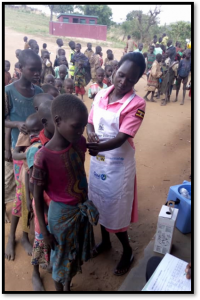 “Florence,” the daughter of subsistence farmers, was able to complete her education and receive support to become an enrolled midwife. While she does not have a full midwifery degree, she has been a tireless advocate for maternal care in the community where she works—partly because her own mother nearly died giving birth to her. Before Florence’s outreach, very few mothers from the community came to the Health Center where she works for ante-natal care or to give birth. Far too many poor mothers in Uganda do not give birth in a healthcare facility, increasing the risks to them and their babies. Because of Florence’s success in convincing mothers about the importance of such care, the facility has actually had to invest in constructing more rooms. She notes that she is “confident with my normal midwifery but need[s] to strengthen abnormal midwifery knowledge…I feel very happy when the mother and her baby are in good condition.” A scale-up scholarship will help her have better skills for managing complications and continuing to serve in this community where she has already made such a difference.
“Florence,” the daughter of subsistence farmers, was able to complete her education and receive support to become an enrolled midwife. While she does not have a full midwifery degree, she has been a tireless advocate for maternal care in the community where she works—partly because her own mother nearly died giving birth to her. Before Florence’s outreach, very few mothers from the community came to the Health Center where she works for ante-natal care or to give birth. Far too many poor mothers in Uganda do not give birth in a healthcare facility, increasing the risks to them and their babies. Because of Florence’s success in convincing mothers about the importance of such care, the facility has actually had to invest in constructing more rooms. She notes that she is “confident with my normal midwifery but need[s] to strengthen abnormal midwifery knowledge…I feel very happy when the mother and her baby are in good condition.” A scale-up scholarship will help her have better skills for managing complications and continuing to serve in this community where she has already made such a difference.
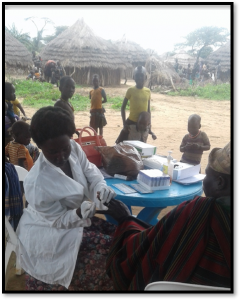 “Priscilla” overcame many challenges in securing an education. Her father would not pay her fees, saying “Girls are useless,” but she was able to complete her school through a combination of aid and her mother’s committed work to raise funds for her fees. She then received support to become an enrolled midwife, and went to a Health Center in a community near the South Sudan border where they had never had any kind of midwife and virtually all births happened at home. “I started with [deliveries] under the tree…I then requested the district for a delivery bed and was granted a birth cushion. Later I improvised in the…dispensing room…. Although it was a very small and congested room, but it was better than under the tree…” Through her efforts, the number of births in a health facility increased. After three years there, she transferred to a health center near the Kenyan border, where community members also often give birth at home. A scale-up scholarship will help Priscilla improve her support of mothers in this community where it is much needed.
“Priscilla” overcame many challenges in securing an education. Her father would not pay her fees, saying “Girls are useless,” but she was able to complete her school through a combination of aid and her mother’s committed work to raise funds for her fees. She then received support to become an enrolled midwife, and went to a Health Center in a community near the South Sudan border where they had never had any kind of midwife and virtually all births happened at home. “I started with [deliveries] under the tree…I then requested the district for a delivery bed and was granted a birth cushion. Later I improvised in the…dispensing room…. Although it was a very small and congested room, but it was better than under the tree…” Through her efforts, the number of births in a health facility increased. After three years there, she transferred to a health center near the Kenyan border, where community members also often give birth at home. A scale-up scholarship will help Priscilla improve her support of mothers in this community where it is much needed.
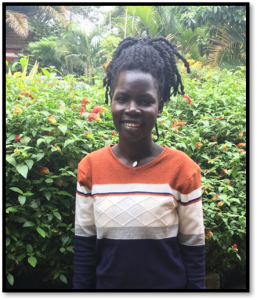 “Chloe” grew up in a family of ten children during the violence of Lord’s Resistance Army. “I witnessed a lot of heart-breaking suffering some of which included mothers dying due to pregnancy relation complication, women and their daughters being raped…. girls being forced into early marriage as a way of finding better life…” She worked hard in school, and was eventually able to become an enrolled midwife. As her first posting, she chose a job in a remote area of Uganda with high illiteracy and severe food insecurity, where very few people made use of health services because other survival issues took precedence. Chloe has been recognized for her outstanding work in this community. Gretta Foundation support will help her scale up her degree so that she has the skills she needs to provide the best care possible to mothers and their babies there.
“Chloe” grew up in a family of ten children during the violence of Lord’s Resistance Army. “I witnessed a lot of heart-breaking suffering some of which included mothers dying due to pregnancy relation complication, women and their daughters being raped…. girls being forced into early marriage as a way of finding better life…” She worked hard in school, and was eventually able to become an enrolled midwife. As her first posting, she chose a job in a remote area of Uganda with high illiteracy and severe food insecurity, where very few people made use of health services because other survival issues took precedence. Chloe has been recognized for her outstanding work in this community. Gretta Foundation support will help her scale up her degree so that she has the skills she needs to provide the best care possible to mothers and their babies there.
“Maddy” was raised on a remote island. Her father died of AIDS and her mother is living with HIV. “For me to go to school [on an] island where girl children are not considered almost as a human being, I had to work hard with my mum…waking up very early…to go fishing so as to get something to eat as well as to sell.” Although her mother was not educated, she was determined that her daughter would complete school. Maddy first became interested in midwifery when she met midwives who would travel to the island to provide care. Maddy volunteered to help organize antenatal visits, and received training as a traditional birth attendant. She loved helping mothers and their babies. The midwives helped her to apply to midwifery school, where she received a scholarship to become an enrolled midwife. She returned to her home island to practice, and while the government is building a Health Center, she notes the lack of qualified workers in such a remote location. “As I was born there, I don’t have any reservations.” She is eager to complete a full midwifery degree so that she has the skills needed for island work. “Once boats leave [when you have an emergency] that meant you had to apply all the knowledge and skills you had since at that time you were the only savior.” Yet she acknowledges the skills she has with only a certificate in midwifery are not adequate to the need. TGF is thrilled to provide a scholarship for her to complete her full degree in midwifery.
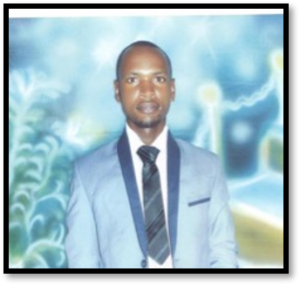 “Charles” is the child of subsistence farmers who struggled to pay his school fees. Yet with their support he persisted. Having seen the often-deadly effects of lack of professional healthcare in his community, he persevered and secured a certificate in nursing. He is currently part of a team that supports the ambulance system that goes out into hard-to-reach areas in his district. This has pushed him to develop further critical care skills. A scale-up scholarship will enable Charles to become a diploma nurse.
“Charles” is the child of subsistence farmers who struggled to pay his school fees. Yet with their support he persisted. Having seen the often-deadly effects of lack of professional healthcare in his community, he persevered and secured a certificate in nursing. He is currently part of a team that supports the ambulance system that goes out into hard-to-reach areas in his district. This has pushed him to develop further critical care skills. A scale-up scholarship will enable Charles to become a diploma nurse.
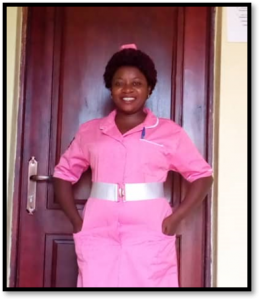 “Alinda” lost her father, a solider in the war against the Lord’s Resistance Army, when she was 6 and several years later lost her mother to undiagnosed cardiac disease. Her stepfather took responsibility for her and she was able to complete her schooling. After volunteering for two years in a local hospital, she was sponsored to get her certificate in nursing. She returned to the hospital and has been working there since, but wants to grow her skills and capacities by completing a full diploma in nursing. “I have a passion to serve in the profession by being exemplary, committed to contribute to the healing ministry of Christ.”
“Alinda” lost her father, a solider in the war against the Lord’s Resistance Army, when she was 6 and several years later lost her mother to undiagnosed cardiac disease. Her stepfather took responsibility for her and she was able to complete her schooling. After volunteering for two years in a local hospital, she was sponsored to get her certificate in nursing. She returned to the hospital and has been working there since, but wants to grow her skills and capacities by completing a full diploma in nursing. “I have a passion to serve in the profession by being exemplary, committed to contribute to the healing ministry of Christ.”
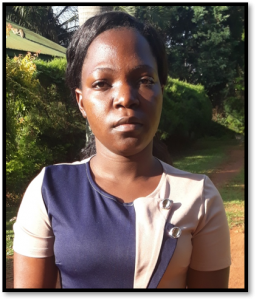 “Racheal” was one of 23 children in her family, a daughter of her father’s third wife. With so many children, the elderly man was unable to support her education, so she worked as a house maid in the bishop’s house for three years, saving as much as she could of her earnings to cover school fees for the last two years of secondary school. She was the only one of her siblings to complete secondary school. She first entered the health field by taking a training course to be a lab assistant at a health center. In this role, she would test mothers for HIV, and was devastated by what she saw: “…most were positive and they were transmitting infections to the newborn… so I decided to change course from a laboratory to midwifery…to be educating mothers [about the danger of delivering outside a health facility].” With the help of a scholarship, she was able to complete a certificate in midwifery in 2016. A Gretta Scholarship will help Racheal scale up to a full midwifery degree so that she can better serve mothers.
“Racheal” was one of 23 children in her family, a daughter of her father’s third wife. With so many children, the elderly man was unable to support her education, so she worked as a house maid in the bishop’s house for three years, saving as much as she could of her earnings to cover school fees for the last two years of secondary school. She was the only one of her siblings to complete secondary school. She first entered the health field by taking a training course to be a lab assistant at a health center. In this role, she would test mothers for HIV, and was devastated by what she saw: “…most were positive and they were transmitting infections to the newborn… so I decided to change course from a laboratory to midwifery…to be educating mothers [about the danger of delivering outside a health facility].” With the help of a scholarship, she was able to complete a certificate in midwifery in 2016. A Gretta Scholarship will help Racheal scale up to a full midwifery degree so that she can better serve mothers.
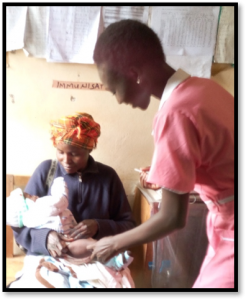 “Penny” is the eldest of her mother’s children in a subsistence farming family where her father has three wives and 15 children. He is also now HIV+, and she has significant responsibilities for her younger siblings, working as an enrolled (certificate) midwife to help support their studies and put food on the table. Her own mother lost two babies in childbirth, attended only by a traditional birth attendant, which is part of what inspired Penny to become a midwife. She also remembers the suffering of women and children when the Lord’s Resistance Army overran local villages, including the murder of her pregnant aunt because the rebels said she would just give birth to a future soldier for the government. Penny has been working as a midwife for four years, and is grateful that a Gretta Scholarship will enable her complete a full degree in midwifery so that she can “acquire more skills and knowledge, especially in handling complicated maternal and neonatal conditions like delivery of an extended breech and neonatal resuscitation.”
“Penny” is the eldest of her mother’s children in a subsistence farming family where her father has three wives and 15 children. He is also now HIV+, and she has significant responsibilities for her younger siblings, working as an enrolled (certificate) midwife to help support their studies and put food on the table. Her own mother lost two babies in childbirth, attended only by a traditional birth attendant, which is part of what inspired Penny to become a midwife. She also remembers the suffering of women and children when the Lord’s Resistance Army overran local villages, including the murder of her pregnant aunt because the rebels said she would just give birth to a future soldier for the government. Penny has been working as a midwife for four years, and is grateful that a Gretta Scholarship will enable her complete a full degree in midwifery so that she can “acquire more skills and knowledge, especially in handling complicated maternal and neonatal conditions like delivery of an extended breech and neonatal resuscitation.”
